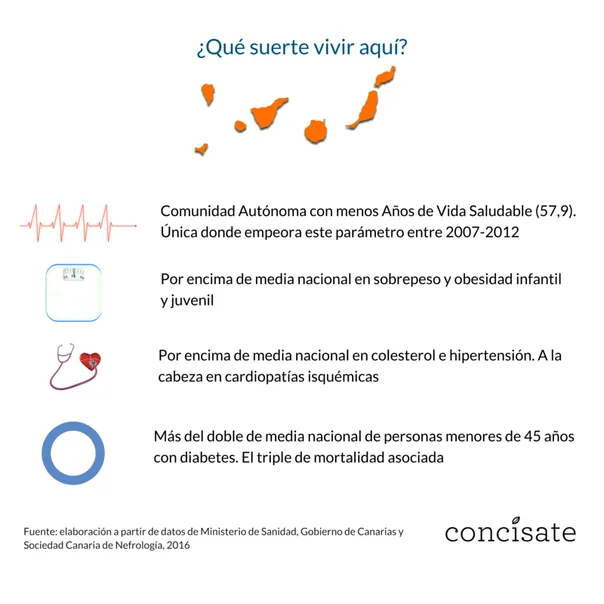The Canary Islands is one of the autonomous communities with the highest index of complications derived from diabetes, such as blindness, amputations or renal failure that leads the patient to dialysis.The data emphasizes that some 70,000 canaries are unaware that they suffer from diabetes, which is a serious risk to their health.
"Dialysis entry is one of the main complications in people with diabetes," said Lidia Blanco, president of Adigran (Association of Diabetics of Gran Canaria) who added that "the latest public health management data indicate usthat 6% of people affected by diabetes throughout Spain are not diagnosed. "
In fact, in the islands the costs of attention of chronic complications caused by diabetes with respect to the rest of the country, according to Blanco, which is also vice president of Fadican (Federation of Diabetes Associations of the Canary Islands).
The President of Adigran adds that in recent years the Canary Islands had decreased the percentage of population affected by diabetes maintaining similar indices to the national average, which is 13.8%.However, the latest indications point to a rebound in the number of people with diabetes in the islands.
As for the causes of these figures, Lidia Blanco said that "type 2 diabetes is related to obesity and in the Canary Islands we have a large part of the obese population."
24% of the population over 18 is OBESA and 40% of them are overweight.With respect to children, it stands out as almost half of them suffers overweight or obesity.
More than 3,000 amputations in the Canary Islands
The medical director of the Paloma Hospital and responsible for the diabetic foot unit, Dr. Javier Aragón, said that diabetic foot injuries are one of the main complications of diabetes.
A bad control of pathology can affect the nerves and blood vessels of this area causing the appearance of ulcers, infections and necrosis.
If these are not treated in time, it can lead to the death of tissues and subsequent amputations.In the Canary Islands more than 3,000 amputations have been made in the last 5 years due to this reason.
However, Dr. Aragon, an international expert in patients with infections that have reached the bone, comments that early care is essential to avoid mutilating treatment.
"The diabetic standing unit of the La Paloma Hospital has reached numerous patients who had advised an amputation in their hospitals and that was not finally necessary," he added.
With conservative surgery techniques, experts from the La Paloma Hospital manage to eliminate part of the infected bone and, by applying priests with advanced techniques, the foot can completely heal without the need for amputation.
Dr. Aragon advises patients suffering from diabetes to "monitor the appearance of ulcers or foot wounds, since 85% of patients suffering amputations began with the appearance of an ulcer."These injuries are in a significant percentage produced by footwear.


